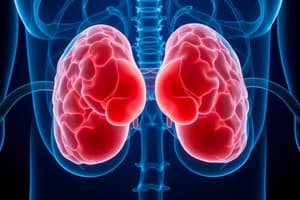Podcast
Questions and Answers
What is the main function of the adrenal glands?
What is the main function of the adrenal glands?
- To produce red blood cells
- To regulate blood sugar levels
- To filter toxins from the body
- To produce hormones (correct)
What is the most common cause of ACTH-dependent Cushing’s syndrome?
What is the most common cause of ACTH-dependent Cushing’s syndrome?
- Adrenal adenomas
- Non-neoplastic corticotropin hypersecretion
- Ectopic ACTH-secreting tumors
- Pituitary adenomas (correct)
What is a specific feature of Cushing’s syndrome?
What is a specific feature of Cushing’s syndrome?
- Hairy back
- Puffy eyes
- Swollen ankles
- Buffalo hump (correct)
What percentage of patients with Cushing’s syndrome experience hypertension?
What percentage of patients with Cushing’s syndrome experience hypertension?
What test can help determine the etiology of hypercortisolism in Cushing’s syndrome?
What test can help determine the etiology of hypercortisolism in Cushing’s syndrome?
What is the goal of treatment for Cushing’s syndrome?
What is the goal of treatment for Cushing’s syndrome?
What is Addison’s disease?
What is Addison’s disease?
Which therapeutic option for Cushing's Syndrome can cause pituitary-dependent hormone deficiencies?
Which therapeutic option for Cushing's Syndrome can cause pituitary-dependent hormone deficiencies?
Which steroidogenic inhibitor can cause side effects like hypertension, sedation, and liver enzyme elevation?
Which steroidogenic inhibitor can cause side effects like hypertension, sedation, and liver enzyme elevation?
Which therapeutic option is similar to ketoconazole but is only available in a parenteral formulation?
Which therapeutic option is similar to ketoconazole but is only available in a parenteral formulation?
Which therapeutic option is a serotonergic antagonist that can decrease ACTH secretion, but should be reserved for non-surgical candidates who fail more conventional therapy?
Which therapeutic option is a serotonergic antagonist that can decrease ACTH secretion, but should be reserved for non-surgical candidates who fail more conventional therapy?
Which therapeutic option is a receptor antagonist that inhibits dexamethasone suppression and increases endogenous cortisol and ACTH values in normal subjects?
Which therapeutic option is a receptor antagonist that inhibits dexamethasone suppression and increases endogenous cortisol and ACTH values in normal subjects?
Which therapeutic option has limited experience in Cushing's syndrome but is highly effective in reversing the manifestations of hypercortisolism?
Which therapeutic option has limited experience in Cushing's syndrome but is highly effective in reversing the manifestations of hypercortisolism?
Which therapeutic option has not demonstrated consistent clinical efficacy for treating Cushing's syndrome, but combination therapy with these agents may prove more efficacious than any single agent?
Which therapeutic option has not demonstrated consistent clinical efficacy for treating Cushing's syndrome, but combination therapy with these agents may prove more efficacious than any single agent?
Which therapeutic option for Cushing's Syndrome can cause pituitary-dependent hormone deficiencies?
Which therapeutic option for Cushing's Syndrome can cause pituitary-dependent hormone deficiencies?
Which steroidogenic inhibitor can cause side effects like hypertension, sedation, and liver enzyme elevation?
Which steroidogenic inhibitor can cause side effects like hypertension, sedation, and liver enzyme elevation?
Which therapeutic option can inhibit the production of cortisol and corticosterone, but can cause side effects like nausea, diarrhea, and CNS effects?
Which therapeutic option can inhibit the production of cortisol and corticosterone, but can cause side effects like nausea, diarrhea, and CNS effects?
Which therapeutic option is a serotonergic antagonist that can decrease ACTH secretion and should be reserved for non-surgical candidates who fail more conventional therapy?
Which therapeutic option is a serotonergic antagonist that can decrease ACTH secretion and should be reserved for non-surgical candidates who fail more conventional therapy?
Which therapeutic option is a receptor antagonist that inhibits dexamethasone suppression and increases endogenous cortisol and ACTH values in normal subjects?
Which therapeutic option is a receptor antagonist that inhibits dexamethasone suppression and increases endogenous cortisol and ACTH values in normal subjects?
Which therapeutic option can be useful for acute hypercortisolemia awaiting surgery, but is only available in a parenteral formulation?
Which therapeutic option can be useful for acute hypercortisolemia awaiting surgery, but is only available in a parenteral formulation?
Which therapeutic option has not demonstrated consistent clinical efficacy for treating Cushing's Syndrome?
Which therapeutic option has not demonstrated consistent clinical efficacy for treating Cushing's Syndrome?
Flashcards are hidden until you start studying
Study Notes
Therapeutic options for Cushing's Syndrome
- Pituitary irradiation can improve symptoms in 50% of patients, but it can take 6-12 months to see improvement and can cause pituitary-dependent hormone deficiencies.
- Steroidogenic inhibitors like metyrapone, aminoglutethimide, and ketoconazole can inhibit cortisol synthesis, but they can cause side effects like hypertension, sedation, and liver enzyme elevation.
- Combination therapy with metyrapone and aminoglutethimide is more effective than either agent alone and has fewer side effects.
- Etomidate is similar to ketoconazole but is only available in a parenteral formulation, making it useful for acute hypercortisolemia awaiting surgery.
- Mitotane can inhibit the production of cortisol and corticosterone, but it can cause side effects like nausea, diarrhea, and CNS effects.
- Cyproheptadine is a serotonergic antagonist that can decrease ACTH secretion, but it should be reserved for non-surgical candidates who fail more conventional therapy.
- Tretinoin can reduce ACTH secretion, but its efficacy in humans is undetermined.
- Other neuromodulatory agents include bromocriptine, cabergoline, valproic acid, octreotide, and rosiglitazone.
- Mifepristone is a receptor antagonist that inhibits dexamethasone suppression and increases endogenous cortisol and ACTH values in normal subjects.
- Limited experience in Cushing's syndrome suggests that mifepristone is highly effective in reversing the manifestations of hypercortisolism.
- None of the neuromodulatory agents has demonstrated consistent clinical efficacy for treating Cushing's syndrome.
- Combination therapy with these agents may prove more efficacious than any single agent.
Studying That Suits You
Use AI to generate personalized quizzes and flashcards to suit your learning preferences.




